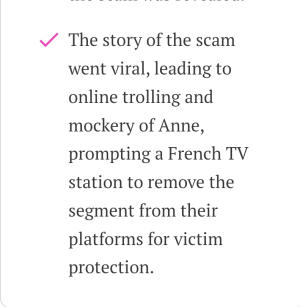Scammer dupes French woman into sending A$1.4 million after fake Brad Pitt romance scam
By
- Replies 29
In a tale that seems almost too bizarre to be accurate, a French woman's adoration for Hollywood star Brad Pitt led her down a devastating path.
The scam, which preyed on her vulnerability and trust, is a stark reminder of the dangers lurking in the digital world, especially for those who may not be as tech-savvy or are going through personal challenges.
This heart-wrenching story exposes how even the most seemingly innocent online interactions can be manipulated by fraudsters. It also sheds light on the emotional toll such scams can take on victims, particularly those already struggling with personal or mental health issues.
Anne, a 53-year-old interior designer, was ensnared in a sophisticated con after being contacted by someone claiming to be Jane Etta Pitt, Brad Pitt's mother, through Instagram.
The scammer's attention to detail and manipulation skills were so refined that they managed to convince Anne that she was not only communicating with Brad Pitt himself but also that they were in a romantic relationship.
The scammers went to great lengths to maintain the illusion, sending Anne AI-generated images of Pitt in various states.
This included undergoing medical procedures and professing love with messages like 'Anne, I love you' and 'I love you so much, my wife.'
Despite never hearing his voice—a red flag she unfortunately overlooked—Anne was drawn deeper into the scammer's web.
The requests for money started small, with a plea for A$15,000 to cover 'customs fees' for gifts Pitt supposedly wanted to send her.
The gifts, predictably, never arrived. Later, after Anne disclosed an impending divorce settlement from her wealthy husband, the scammers upped the ante, fabricating a story about Pitt suffering from kidney cancer and needing A$1.3 million for treatment.
It's a heartbreaking story, and what's worse is that Anne, who was reported to have mental health issues, has been subjected to cruel online trolling and mockery after her story went public.
The ridicule became so severe that a segment about her experience on the French TV program 'Sept a Huit' was removed from their platforms to protect her from further harm.
The psychological impact of believing a celebrity has taken a personal interest in us can be profound.
It taps into our innate desire for recognition and validation, which can be incredibly potent if we feel lonely or undervalued.
This is why it's crucial to remain grounded and remember that real celebrities have channels of communication far removed from direct messages to fans.
Always approach unsolicited contact with scepticism and remember that if something seems too good to be true, it probably is.
Members of our Seniors Discount Club, this cautionary tale is a reminder that scams can happen to anyone, and they often target those who are most vulnerable.
Stay vigilant and sceptical, especially when dealing with strangers online. Here are some tips to help you avoid falling victim to similar scams:
Never share money or personal information with someone you met online, and verify identities, especially if they claim to be famous.
Be cautious of emotional stories designed to manipulate you, and consult trusted friends or family if you're unsure.
Report any suspicious activity to authorities, such as the ACCC in Australia, and educate yourself on common scam tactics to stay protected.
In similar news, Spanish police arrested five individuals for scamming women by impersonating Hollywood star Brad Pitt.
The scammers tricked two women into believing they were in a relationship with Pitt, defrauding them of A$527,400.

How can people protect themselves from scams that exploit emotions, especially involving celebrities? What red flags should be watched for when talking to someone claiming to be a celebrity online? Let us know in the comments below.
The scam, which preyed on her vulnerability and trust, is a stark reminder of the dangers lurking in the digital world, especially for those who may not be as tech-savvy or are going through personal challenges.
This heart-wrenching story exposes how even the most seemingly innocent online interactions can be manipulated by fraudsters. It also sheds light on the emotional toll such scams can take on victims, particularly those already struggling with personal or mental health issues.
Anne, a 53-year-old interior designer, was ensnared in a sophisticated con after being contacted by someone claiming to be Jane Etta Pitt, Brad Pitt's mother, through Instagram.
The scammer's attention to detail and manipulation skills were so refined that they managed to convince Anne that she was not only communicating with Brad Pitt himself but also that they were in a romantic relationship.
The scammers went to great lengths to maintain the illusion, sending Anne AI-generated images of Pitt in various states.
This included undergoing medical procedures and professing love with messages like 'Anne, I love you' and 'I love you so much, my wife.'
Despite never hearing his voice—a red flag she unfortunately overlooked—Anne was drawn deeper into the scammer's web.
The requests for money started small, with a plea for A$15,000 to cover 'customs fees' for gifts Pitt supposedly wanted to send her.
The gifts, predictably, never arrived. Later, after Anne disclosed an impending divorce settlement from her wealthy husband, the scammers upped the ante, fabricating a story about Pitt suffering from kidney cancer and needing A$1.3 million for treatment.
It's a heartbreaking story, and what's worse is that Anne, who was reported to have mental health issues, has been subjected to cruel online trolling and mockery after her story went public.
The ridicule became so severe that a segment about her experience on the French TV program 'Sept a Huit' was removed from their platforms to protect her from further harm.
The psychological impact of believing a celebrity has taken a personal interest in us can be profound.
It taps into our innate desire for recognition and validation, which can be incredibly potent if we feel lonely or undervalued.
This is why it's crucial to remain grounded and remember that real celebrities have channels of communication far removed from direct messages to fans.
Always approach unsolicited contact with scepticism and remember that if something seems too good to be true, it probably is.
Members of our Seniors Discount Club, this cautionary tale is a reminder that scams can happen to anyone, and they often target those who are most vulnerable.
Stay vigilant and sceptical, especially when dealing with strangers online. Here are some tips to help you avoid falling victim to similar scams:
Never share money or personal information with someone you met online, and verify identities, especially if they claim to be famous.
Be cautious of emotional stories designed to manipulate you, and consult trusted friends or family if you're unsure.
Report any suspicious activity to authorities, such as the ACCC in Australia, and educate yourself on common scam tactics to stay protected.
In similar news, Spanish police arrested five individuals for scamming women by impersonating Hollywood star Brad Pitt.
The scammers tricked two women into believing they were in a relationship with Pitt, defrauding them of A$527,400.
Key Takeaways
- A French woman was scammed out of A$1.4 million after believing she was in a relationship with Hollywood star Brad Pitt.
- The scam involved AI-generated images and claims that Pitt needed money for cancer treatment after being left penniless by Angelina Jolie.
- The woman, identified as Anne, has since suffered severe depression and has been hospitalised after the scam was revealed.
- The story of the scam went viral, leading to online trolling and mockery of Anne, prompting a French TV station to remove the segment from their platforms for victim protection.
Last edited by a moderator:









